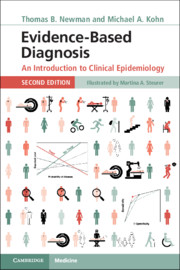Book contents
- Evidence-Based Diagnosis
- Evidence-Based Diagnosis
- Copyright page
- Dedication
- Contents
- Preface
- Acknowledgments
- Chapter 1 Introduction
- Chapter 2 Dichotomous Tests
- Chapter 3 Multilevel and Continuous Tests
- Chapter 4 Critical Appraisal of Studies of Diagnostic Test Accuracy
- Chapter 5 Reliability and Measurement Error
- Chapter 6 Risk Predictions
- Chapter 7 Multiple Tests and Multivariable Risk Models
- Chapter 8 Quantifying Treatment Effects Using Randomized Trials
- Chapter 9 Alternatives to Randomized Trials for Estimating Treatment Effects
- Chapter 10 Screening Tests
- Chapter 11 Understanding P-Values and Confidence Intervals
- Chapter 12 Challenges for Evidence-Based Diagnosis
- Answers to Problems
- Index
- References
Chapter 3 - Multilevel and Continuous Tests
Published online by Cambridge University Press: 02 May 2020
- Evidence-Based Diagnosis
- Evidence-Based Diagnosis
- Copyright page
- Dedication
- Contents
- Preface
- Acknowledgments
- Chapter 1 Introduction
- Chapter 2 Dichotomous Tests
- Chapter 3 Multilevel and Continuous Tests
- Chapter 4 Critical Appraisal of Studies of Diagnostic Test Accuracy
- Chapter 5 Reliability and Measurement Error
- Chapter 6 Risk Predictions
- Chapter 7 Multiple Tests and Multivariable Risk Models
- Chapter 8 Quantifying Treatment Effects Using Randomized Trials
- Chapter 9 Alternatives to Randomized Trials for Estimating Treatment Effects
- Chapter 10 Screening Tests
- Chapter 11 Understanding P-Values and Confidence Intervals
- Chapter 12 Challenges for Evidence-Based Diagnosis
- Answers to Problems
- Index
- References
Summary
Up to this point, we have discussed the accuracy of dichotomous tests – those that are either positive or negative for the disease in question. Now, we want to consider the accuracy of multilevel tests – those with more than two possible results. As discussed in Chapter 2, the results of such tests can be ordinal if they have an intrinsic ordering, like a urine dipstick test for white blood cells, which can be negative, trace positive, or positive. Test results also can be discrete (having a limited number of possible results, like the dipstick test) or continuous, with an essentially infinite range of possibilities (like a serum cholesterol level or white blood cell count).
Information
- Type
- Chapter
- Information
- Evidence-Based DiagnosisAn Introduction to Clinical Epidemiology, pp. 47 - 74Publisher: Cambridge University PressPrint publication year: 2020
References
References
References
Accessibility standard: Unknown
Why this information is here
This section outlines the accessibility features of this content - including support for screen readers, full keyboard navigation and high-contrast display options. This may not be relevant for you.Accessibility Information
- 1
- Cited by
